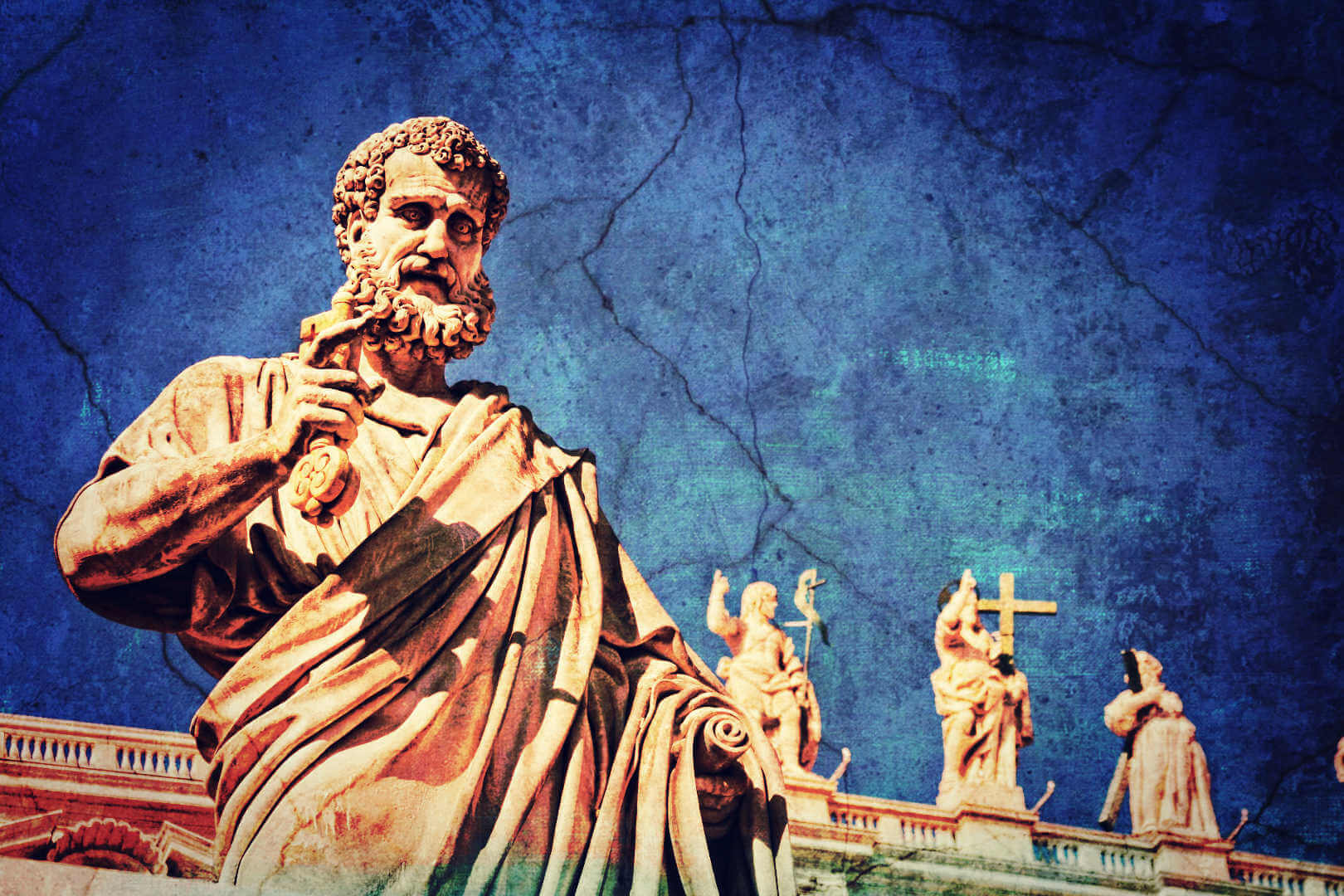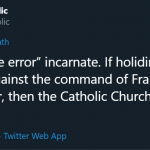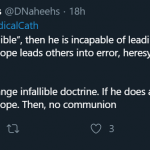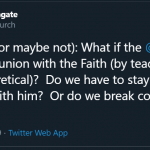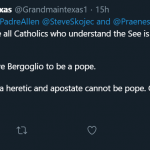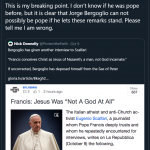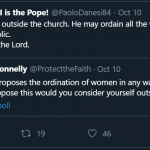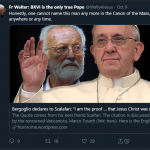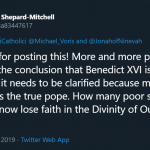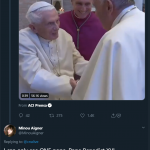It was once the sort of question that was shared in hushed tones after a few drinks, back in the early days of the pontificate when only a few people seemed to be aware just how bad things were.
“What if Benedict is somehow still the pope?”
“I think Francis may have lost the office of the papacy through heresy, and we just don’t have an official judgment on it yet.”
It would be discussed, debated, people would shrug and pour another drink, and the conversation would uneasily shift to other topics, an unfamiliar sense of confusion about the status of the Church and its most pivotal institution hanging over things like a cloud.
As time went on, people would bring up quotes from St. Robert Bellarmine, Francisco Suárez, and Thomas Cajetan, on whether or not a pope could depose himself or be deposed by a council. There seemed to be no unanimity, and everything was phrased as an unlikely hypothetical.
Then, in December 2016, Cardinal Raymond Burke famously gave new life to those discussions when he said in an interview with Catholic World Report that “If a Pope would formally profess heresy he would cease, by that act, to be the Pope. It’s automatic. And so, that could happen.”
The same month, canonist Dr. Edward Peters echoed this idea on his website, offering some commentary on what canon law and canonical tradition have to say on the matter. The post quotes extensively from eminent canonists and summarizes the theological debates of the aforementioned theologians, and demands to be read in its entirety lest important distinctions be lost, so I encourage you to do so. But the conclusion Dr. Peters reaches is clear:
In sum, and while additional important points could be offered on this matter, in the view of modern canonists from Wernz to Wrenn, however remote is the possibility of a pope actually falling into heresy and however difficult it might be to determine whether a pope has so fallen, such a catastrophe, Deus vetet, would result in the loss of papal office.
May that fact serve as a check against those tempted to engage in loose talk about popes and heresy.
We are, of course, well past the stage of mere “loose talk.” Francis has changed the infallible teaching on the death penalty in the Catechism. He has formalized guidelines permitting the reception of communion by adulterers as an official act of his papacy. He has denied the Church’s unique role in salvation in the Abu Dhabi Statement, and refused to make a public correction. He has been reported, multiple times, to have denied the existence of Hell. He has allowed pagan worship in the Vatican, and has permitted one of his key synod organizers to re-open the question of women’s ordination after it was definitively closed. And now there is a new allegation that he doesn’t even believe in the divinity of Jesus.
Pope Francis has started doctrinal fires burning on many fronts. And the list above doesn’t even touch on the staggering number of lesser distortions of the Scriptures and traditionally held teachings found in his various homilies and public speeches. There is no shortage of material to choose from that points to the idea that, at the very least, Francis is a material heretic. And there have been formal efforts to recognize that.
It has now been seven months since Bishop Athanasius Schneider penned his essay, “On the Question of a Heretical Pope.” Schneider doesn’t mention Francis by name once, but he cites several of his acts and statements, making clear who it is that made the bishop feel compelled to address such a controversial question.
The essay opens by proposing that “The issue of how to handle a heretical pope, in concrete terms, has not yet been treated in a manner which approaches anything like a true general consent in the entire Catholic tradition.”
This is true, and is an important point – it’s why there is so much confusion right now.
His conclusion was that the “act of deposition of a pope because of heresy or the declaration of the vacancy of the Papal chair because of the loss of the papacy ipso facto on behalf of a heretical pope would be a revolutionary novelty in the life of the Church, and this regarding a highly important issue of the constitution and the life of the Church.”
In other words, Schneider doesn’t think it can, or should be done.
And yet, this is just one conclusion. As the days grow darker, and more and more clearly anti-Catholic images, actions, gestures, and words come out of Rome, Catholics who have grown impatient with feeling fundamentally at odds with this man the Church has told them is their pontiff and spiritual father are increasingly unwilling to accept the mixed signals, the silence, and the lack of anything like action on the part of their shepherds. They no longer know if and when to submit to him, how much he may be criticized, resisted, or even opposed.
And that is inducing many of them to disregard him altogether.
Take a look at some of the following sentiments, captured from the past few days on social media. We have gone from those whispered questions in private conversations to seeing them in the open them nearly every day now (click the images to enlarge them):
I have managed to become notorious for attempting to hold the line on the proposition that while Francis is a terrible pope, he is the true pope.
I have been accused of being a “double agent,” of being a paid shill for the Bergoglian regime, and of doing all of this cynically to boost fundraising efforts for 1P5. (The same people who make such accusations like to note that our traffic and donations have decreased since I started taking this stand, so if I’m doing it for popularity or financial gain, I’m terrible at it.)
The fact is, as I’ve explained before, I’ve only taken this stand because I believe it’s true. I believe that the Church’s teaching on infallibility extends to the “dogmatic fact” of pope who has been “universally accepted.” I believe that if my understanding of universal acceptance is correct, then we have infallible certainty that when the Church tells us we have a pope — and there is no contested claim to the throne — then that man is the pope.
As the Catholic encyclopedia says, “it is a dogma of faith that every pontiff duly elected and recognized by the universal Church is a successor of Peter.” As an infallible act logically implies, universal acceptance would preclude a false conclave. As St. Alphonsus Liguori taught, “It is of no importance that in past centuries some pontiff was illegitimately elected or took possession of the pontificate by fraud. It is enough that he was accepted afterwards by the whole Church as pope, since by such acceptance he would have become the true pontiff.”
And as canon 751 says, “Schism is the withdrawal of submission to the Supreme Pontiff or from communion with the members of the Church subject to him.”
There is no more basic act of refusing submission to the Supreme Pontiff than to say, “You ain’t it, chief.”
And yet I’m sympathetic to the temptation, because I have no idea how to explain in any way that is remotely satisfying how a man like Jorge Bergoglio can occupy the papal office if infallibility is truly any kind of guarantee that the Church and the pope will not lead us into error and sin. I believe I understand the teaching on a universally elected pope, and I believe it demands our assent. But in the face of what we are confronted with, I can’t preclude the possibility that I’ve missed something.
Whatever our beliefs about the status of the papacy, one thing is certain: Francis occupies the office and nobody else is laying claim to it. He has the power, and nothing is being done to stop it. And he is wielding it to harm the Church.
Perhaps something can be done about this, perhaps not. I don’t know. It remains a topic of heated debate. But I think we all agree that it’s past time a lot more effort was expended in finding out. This can’t simply be ignored until it goes away. We should be concerned about schism because it is a sin, with real effects on the souls who embrace it, but there’s no denying that a de facto schism of the Church — which looks more like a shattering than a clean break — is already here. That cat won’t go back into the bag until this entire mess is cleaned up, true doctrine restored, and the Church, hopefully unlike Humpty Dumpty, can be put back together again.
It’s a work that may take generations. But it can’t wait. And I am shocked how little effort is being made by those responsible for the care of souls and the defense of the faith.
Where is the sense of urgency?
We can’t sit on our hands until a future pontificate or council. Right now, we need a serious effort from theologians, canonists, bishops, and cardinals. This topic cannot be left untouched. It should be a priority issue for every single God-fearing, God-loving Catholic with the grace of state or the education and knowledge to begin tackling these questions. The number of people who believe the actions of Francis are entirely incompatible with the papal office and its protections and charism are growing by the hour. Constant repetition that “Francis hasn’t done anything ex cathedra so we’re in the clear” are pedantic and lazy, and they’re not stopping people from reaching their own conclusions, or following people who offer erroneous ones.
We need more. And if the best, most qualified minds in the Church don’t tackle this, the amateurs will continue to do so, and they will make an awful mess of it. It is imperative that more be done, and there is no time to lose.
Bishop Schneider, whether you agree with him or not, has made such an attempt. Bishop Gracida, whether you agree with him or not, has made an attempt. The scholars who wrote the open letter accusing Francis of heresy, whether you agree with them or not, have made an attempt.
That’s all I can think of. Is that it?
The situation demands a serious, scholarly and ecclesiastical effort to grapple the reality that none of us can deny: our pope treats heresy like his personal plaything, and SOMETHING MUST BE DONE ABOUT IT before more people lose their faith. Before more Catholics reach the conclusion that Christ’s promises to the Church were all just a lie, or that the truth must really be in some other Christian profession, or that they can just make up their own version of a Church in which they decide who the pope is, or isn’t. Without true leadership and guidance, everything will continue falling apart, and the damage to many souls will be irreparable.
When Bellarmine, et. al., were examining this proposition, it was seen as an unlikely hypothetical. It’s not anymore. We do not have the luxury of time. We need as many people as possible working together on this. You cannot just dismiss the various theories and the people who are reaching them in desperation as crazy or not worth your time. We have an absolute crisis of leadership, and you should assume that if you don’t address this, no one will.
For the love of God, find your courage and speak!

